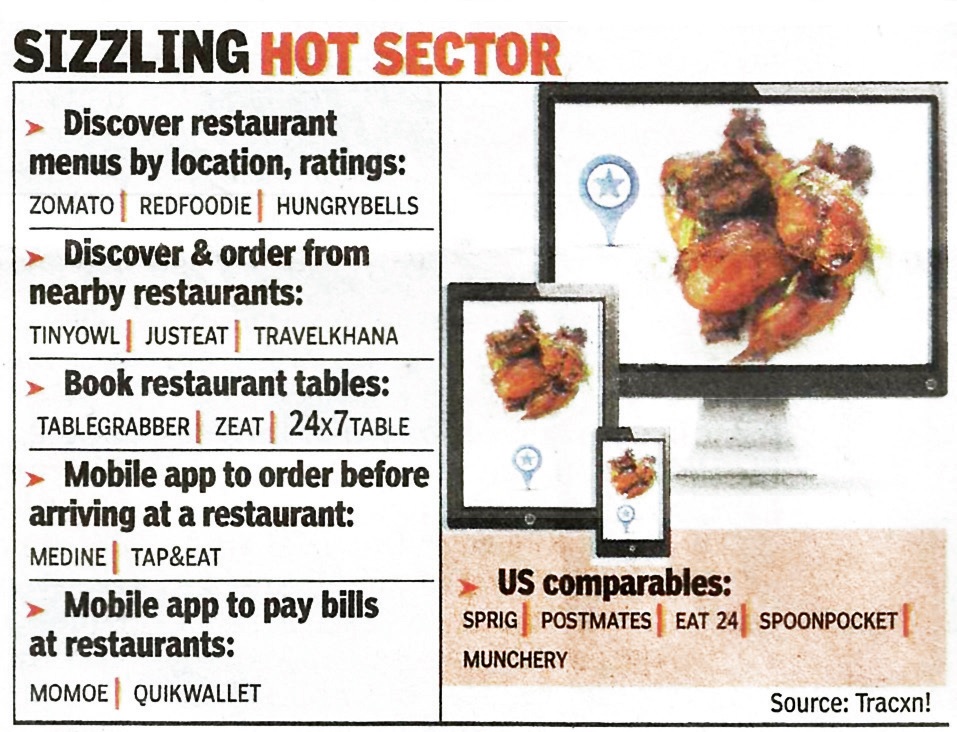Riding on the crest of a food-tech wave, Yumist (co-founded by Zomato’s ex-chief marketing officer), Frsh and Mumbai-based HolaChef have raised funds at a time when investors are chasing food-related startups as the next big consumer internet opportunity in India. While Orios Venture Partners has invested in Yumist, India Quotient has backed HolaChef and Gurgaon based Frsh (Kae Capital is a co-investor). These startups – operating in what was by far the hottest sector of 2014 when 66 food-tech companies were created – are expected to attract a rush of early – stage capital this year. All this on the back of on-demand food delivery gaining popularity among urban Indians who are increasingly looking for healthier food options at reasonable price points simply by firing a mobile app. Alok Jain, who co-founded the three-month-old Yumist along with restaurateur Abhimanyu Maheshwari, says the idea behind the Gurgaon based startup was to solve the customer’s pain point of daily meals at the workplace. “We own the production of the meal, do our own delivery, which means that we offer consistent quality. The average delivery time for us is 20 minutes and our vegetarian meals are priced at an average `85, which will go down further as we launch a meal box.“ Yumist, which caters to the Gurgaon area at present, will expand to all of Delhi NCR by the end of the year and then move to other cities in the country. “The India meals market is very large around middle income and lower income. Food-tech startups will have to differentiate from the US/Europe by tweaking end product pricing significantly,“ says Rehan Yar Khan, general partner, Orios Venture Partners, which put in a million dollars in Yumist. All the early-stage deals have been in the range of $1-2 million, the largest being TinyOwl, which received $3 million from Sequoia Capital and Nexus Venture Partners last year. While the first-gen of food tech startups like Zomato were only marketplaces connecting restaurants to consumers, this new breed of players is handling supply chain and logistics, and wants to own the offering fully. The opportunity is huge considering the Indian restaurants servicing industry is estimated at over $50 billion, out of which only 5-6% is organized currently . “Food is entirely unorganized. Real estate and cost of capital make offline chains tough to turn profitable,“ says Anand Lunia, founder, India Quotient, an early-stage fund. Most food tech startups have restricted themselves to their home cities for now, typically starting operations in one neighbourhood. So Bangalore has SpoonJoy (angel-funded by the likes of Flipkart’s Sachin Bansal), Eatlo and Freshmenu, Gurgaon has BiteClub and Eatonomist, and Mumbai has Resotaste and iChef, besides many others. “Food tech is a local, mobile and on-demand problem for founders, this is a very exciting problem to solve. And for investors, this is a large market if solved. It needs to get crowded further before winners will start to emerge,“ says Zishaan Hayath, an entrepreneur and angel investor. Saurabh Saxena, who cofounded HolaChef along with his IIT-Bombay batchmate Anil Gelra, says they are betting on their predictive algorithms, which will be able to predict the type of demand that exists and create supply accordingly with their chefs. (Source: The Times of India, Ahmedabad, February 02, 2015)
Disclaimer: The information provided within this publication / eBook/ content is for general informational purposes only. While we try to keep the information up-to-date and correct, there are no representations or warranties, express or implied, about the completeness, accuracy, reliability, suitability or availability with respect to the information, products, services, or related graphics contained in this publication / eBook/ content for any purpose. Any use of this information is at your own risk.
 Youth
Youth
 Women
Women
 Research for Ishrae
Research for Ishrae







